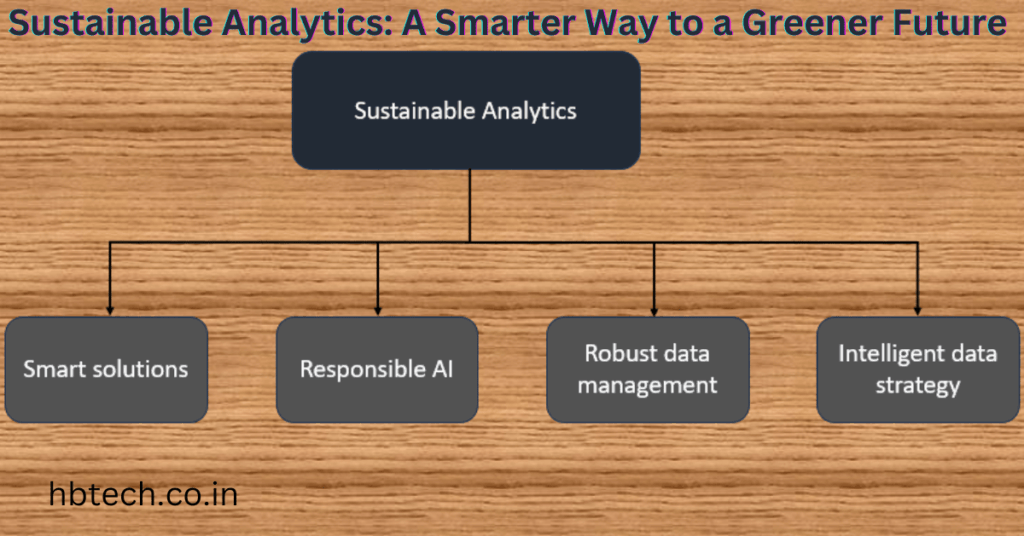In today’ s world, where data is king and sustainability is a growing priority, the idea of sustainable analytics has emerged. It’s all about using data in smarter ways that help businesses succeed while also taking care of our planet. As companies rely more on data to make decisions, it’s important to ensure the tools and systems they use are environmentally friendly and socially responsible.
Let’s dive into what sustainable analytics is, why it matters. and how organizations can adopt it.
Sustainable Analytics
Sustainable analytics means analyzing data in ways that reduce environmental harm while promoting ethical and socially responsible practices. It consider ‘s the energy and resources needed to process data and ensures the technology behind it is as green as possible.
The demand for data has grown massively, and so has the energy used to support it. Data centers, cloud computing , and advanced technologies like artificial intelligence (AI) use significant amounts of electricity. Sustainable analytics tackles this issue by focusing on efficiency and reducing the environmental footprint of these systems.
Why Is Sustainable Analytics Important?
1. Reducing Environmental Impact
Data centers, where information is processed and stored , use a lot of energy. According to the International Energy Agency, these facilities account for about 1% of global electricity consumption. Sustainable analytics helps lower this energy usage by optimizing systems and using renewable energy sources.
2. Aligning with Sustainability Goals
Many companies have committed to environmental, social, and governance (ESG) goals. Using sustainable analytics ensures the processes they use to track and achieve these goals don’t unintentionally harm the environment.
3. Saving Money
Green solutions often lead to cost savings. For example, optimizing data storage, eliminating unnecessary computations, and improving energy efficiency can reduce expenses tied to electricity and hardware maintenance.
4. Building Trust
Consumers and investors prefer companies that prioritize sustainability. Adopting sustainable analytics shows a commitment to doing business responsibly , which can enhance a brand’s reputation.
How to Make Analytics Sustainable
1. Use Energy-Efficient Technology
Invest in energy-efficient servers and data centers. Technologies like virtualization (which lets multiple tasks run on fewer machines) and advanced cooling systems can significantly cut energy use.
2. Choose Green Cloud Services
Switch to cloud providers that prioritize sustainability. Many companies, like Google Cloud and Microsoft Azure, have pledged to run on 100% renewable energy and offer tools to reduce energy consumption.
3. Focus on Quality Over Quantity
Not all data needs to be stored or processed. By analyzing only what’s essential, companies can save energy. Strategies like compressing data and deleting duplicates can further reduce storage needs.
4. Optimize Algorithms
The programs used to process data can be energy -hungry. Choosing simpler, more efficient algorithms or optimizing existing code can make a big difference.
5. Be Ethical
Sustainability isn’t just about the environment—it’s also about fairness. Make sure analytics avoid biases, respect user privacy, and align with broader societal values.
Analytics as a Tool for Sustainability
Beyond making analytics sustainable, businesses can use data to promote sustainability in other areas. For example;
- Tracking Carbon Footprints: Analytics can help measure and reduce emissions.
- Streamlining Supply Chains: Data insights can identify ways to cut waste and save energy.
- Supporting Renewable Energy: Predictive analytics can improve the efficiency of solar and wind power grids.
- Reducing Waste: Companies can use data to design systems for recycling and reusing resources.
When businesses use analytics to drive sustainability efforts, they create a ripple effect that benefits the planet.
Challenges and What’s Next
Making analytics sustainable isn’t always easy. It often requires upfront investments in green technologies and changes to existing processes. Additionally, there ’s still work to be done in setting industry standards and accurately measuring the environmental impact of data operations.
However, the future looks promising. Innovations like quantum computing, edge computing (processing data closer to where it’s generated), and advanced AI could make analytics even more energy-efficient. Collaboration between governments, tech companies, and organizations will also be key in scaling sustainable practices.
Sustainable analytics is about using data responsibly—finding a balance between meeting business needs and protecting the environment. By adopting greener technologies and ethical practices, companies can not only reduce their carbon footprint but also build trust with customers and stakeholders.
As the world moves toward more sustainable practices, analytics can play a major role in driving meaningful change. It ’s a smart way to make data work for businesses and the planet alike.
Frequently Asked Questions(FAQs)
What is sustainable analytics?
Sustainable analytics is the practice of using data analysis in ways that minimize environmental impact and promote ethical, socially responsible practices. It focuses on reducing energy consumption, optimizing data processes, and ensuring technology use aligns with sustainability goals.
Why is sustainable analytics important?
Sustainable analytics is crucial because it helps reduce the environmental footprint of data operations, aligns with corporate sustainability goals, saves costs through energy efficiency, and builds trust with customers and stakeholders by demonstrating a commitment to responsible practices.
What are the benefits of sustainable analytics?
The key benefits include:
Reduced environmental impact.
Alignment with ESG (Environmental, Social, and Governance) goals.
Cost savings from energy-efficient practices.
Enhanced reputation and trust among consumers and stakeholders.What challenges are associated with sustainable analytics?
Challenges include the upfront cost of green technologies, the complexity of transforming existing systems, and the lack of industry-wide standards for measuring the environmental impact of data operations.
What is the future of sustainable analytics?
The future of sustainable analytics lies in emerging technologies like quantum computing, edge computing, and advanced AI, which promise greater energy efficiency. Collaboration between governments, tech companies, and organizations will also play a crucial role in scaling sustainable practices.









